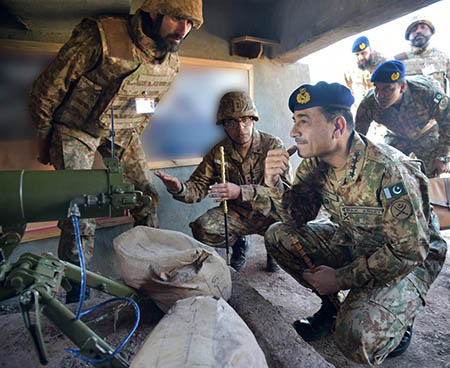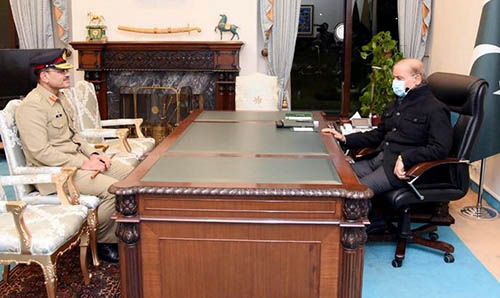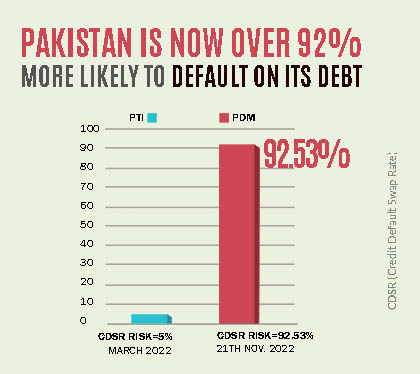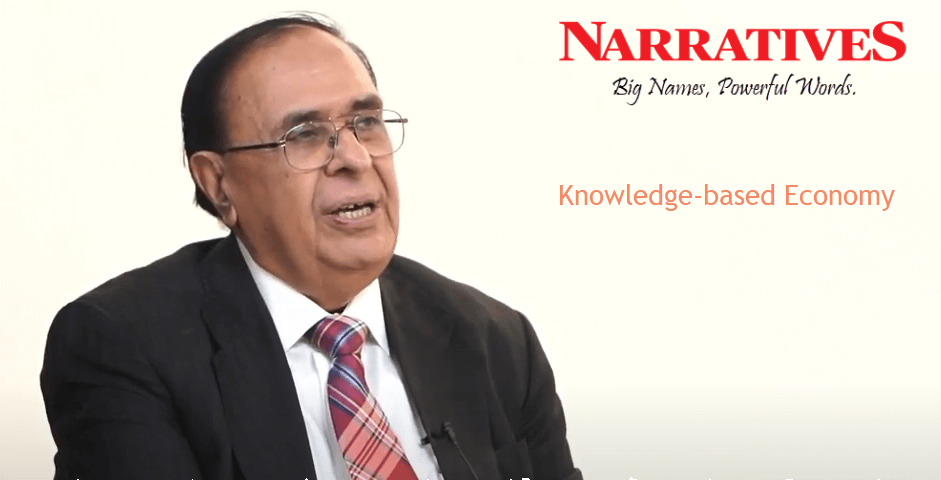On December 1, just two days after assuming the command of the Pakistan Army, Chief of Army Staff (COAS) General Syed Asim Munir visited the frontline troops in the Rakhchikri Sector of the Line of Control in the disputed Himalayan region of Kashmir. This was the new army chief’s first official activity, which was shared by the Inter-Services Public Relations (ISPR) along with the usual television footage and a photograph.
“We have noticed highly irresponsible statements from the Indian leadership on Gilgit-Baltistan and Azad Jammu Kashmir recently,” the ISPR quoted him as saying. “Let me make it categorically clear … Pakistan’s armed forces are ever ready, not only to defend every inch of our motherland, but to take the fight back to the enemy, if ever war is imposed on us,” said General Munir.
The symbolism of General Munir’s visit to Kashmir and his choice of words as he warned India could not have been more crystal clear for friends and foes alike. Unlike his predecessor, General Qamar Javed Bajwa, who failed to even mention Kashmir in his last address at the passing-out parade of the 146th PMA Long Course at the Pakistan Military Academy, Kakul, on October 8, in which he called for regional peace, General Munir said that any misconception resulting in a misadventure will always be met “with (the) full might of our armed forces, backed by a resilient nation.” The COAS added, “The Indian state will never be able to achieve her nefarious designs. The world must ensure justice and deliver what is promised to the Kashmiri people as per UN resolutions.”
Many defence analysts concur with the assessment that the approach of the two generals in regard to India is visibly different.
General Bajwa’s tone had remained overwhelmingly conciliatory throughout his six-year term in office, despite India’s belligerence towards Pakistan, which included the Indian Air Force’s failed strike on Balakot on February 26, 2019, following which Pakistan retaliated and downed two Indian aircraft.
According to Lt. General (retired) Asif Yasin Malik, the new COAS is trying to distance himself from General Bajwa’s soft approach on India. “His statement was in line with national aspirations and Pakistan’s longstanding position on Kashmir,” said Malik, who has in the past served as the country’s Defence Secretary. “General Bajwa wanted to portray himself as a peacenik – perhaps to please the western world. But peace and normal relations with India are possible only on equal terms and remain linked to the resolution of the Kashmir dispute,” said the General. “Pakistan is not a warmonger… we may be one-fifth the size of India, but we cannot compromise on Kashmir. General Bajwa should have kept in mind that peace efforts cannot be unilateral, only reciprocal.”

However, while echoing the same sentiments on the issue, political analyst and commentator Huma Baqai contended that Pakistan’s hard talk on Kashmir will have zero impact on India. “India has changed the status of Kashmir, making it part of its union territory on August 5, 2019. And they have sustained the impact of the change… Imran Khan raised the issue at the UN General Assembly and Gen. Bajwa did all his soft-talk, but nothing happened. It will be interesting to see what strategy General Asim Munir will adopt on Kashmir,” she said. Baqai added that Pakistan faces a greater threat on its western frontier from Afghanistan than it does on the eastern front from India. “With the surge in terrorism as well as the aggressive attitude of the Afghan Taliban, Pakistan needs to do all its hard talk on the western frontier rather than on the eastern one – at least for now.”
General Munir’s hardline stance notwithstanding, Pakistan’s traditional rivalry with India or the challenges on the western frontier might, in fact, not be the top item on the army chief’s agenda.
Keeping in view the overall national security paradigm, it is the continuing political instability in the country, which emerges as the biggest internal threat for Pakistan — far graver than the external one. Without political stability and a strong government, the country is neither in a position to fix its economy, nor manage defence and foreign relations effectively.
According to Baqai, the political and constitutional crisis is aggravating. “Pakistan needs a triangular consensus involving the judiciary, the army and the political forces on how to get out of this nonsense.” So, despite the previous chief’s much-propagated position that the Pakistan Army is now “apolitical” and “neutral,” there appears no option for the COAS but to intervene in political matters to put the house in order. “Where does the buck stop?” asked Huma Baqai. “Of course, at the GHQ. The role of the army in resolving political crises is inevitable … either they do it quietly, or otherwise. But visibly or invisibly, this role is now a must.”
In a developing country like Pakistan, which has a history of the military having a dominant role in the country’s political and foreign relations’ spheres due to its flawed and weak civil institutions, it acts as a stabilising factor. Therefore, the Pakistan Army has to stick to its traditional role rather than suddenly pull itself out of the political turf, where civilian leaders have shown umpteen times that they lack the capacity and ability to sort out matters on their own, in Parliament or outside.

For ordinary Pakistanis, the country has further slid into the continuing political crisis generated since the Pakistan Army announced its decision to remain apolitical in February 2022. Critics say that General Bajwa did no service to his institution or the country by undermining the stabilising role of the army and accusing his predecessors of “unconstitutional political interventions,” ignoring the objective conditions of those times which necessitated them. By General Bajwa’s own admission, he and his colleagues had also remained directly involved in politics, but ironically, that role, rather than being consistent, swung from one extreme to another.
General Bajwa’s so-called “politically correct” stance might have won him some applause in the west and among the tiny class of Pakistani liberals and sub-nationalist forces wanting to weaken this institution, but for a vast majority of Pakistanis, it proved disappointing. This remains why not just General Bajwa, but the institution itself has increasingly faced unprecedented criticism from the people. They – rightly or wrongly — see the Pakistan Army’s new position as supporting and patronising some of the country’s most corrupt politicians. Even many of the most ardent supporters of the Pakistan Armed Forces have been seen criticising the country’s most powerful, disciplined and hitherto most respected institution, as they believe it has compromised not just its anti-corruption narrative, as once articulated by General Raheel Sharif, but that it has also compromised on Kashmir under General Bajwa’s watch.
This negative perception about the army and the country’s political turmoil is the legacy General Bajwa has left the new COAS General Asim Munir, who faces a challenging situation on both the external and the internal fronts.
When General Raheel Sharif left and General Bajwa took over command, the Pakistan Army was at the zenith of its popularity due to its success in the war against terrorism, its strong anti-corruption narrative, and its unyielding stance on Kashmir. That momentum was present and visible in the initial years of General Bajwa’s six-year command, but towards the end, he was seen climbing down on all three fronts. In recent months, there has been a big surge in terrorism, all the politicians tainted with corruption are not just back in power but have even diluted the anti-corruption laws, and the Kashmir issue has been pushed to the back-burner of the national agenda.
Against the backdrop of growing public discontent, frustration and anger on all these issues, along with the ongoing economic downturn, COAS General Asim Munir will literally have to walk through a minefield not just to restore the image of the Pakistan Army, but to try and steer the country out of the current crises it is riven by.
The choices for General Munir are limited, stark and difficult. The biggest question is how to restore political normality in the country when the Shehbaz Sharif-led coalition government and its nemesis, Imran Khan’s Pakistan Tehreek-e-Insaf (PTI) have taken maximalist positions.
The government — nervous because of Imran Khan’s massive popularity and its own inability to deliver on the economic front — does not want elections in the country at any cost. The fear of the resumption of the accountability process if Imran Khan returns to power is giving the ruling Pakistan Democratic Movement (PDM) leaders sleepless nights, although despite the history of distrust with the Pakistan Army, their relations at this point appear on the right track – at least for now. Imran Khan and his followers are, for their part, not ready to settle on anything less than general elections – and the sooner the better.
The real irony of the situation is that the Army’s current key allies – the component parties of the ruling PDM – are, in their essence, the institution’s biggest critics. The PML-N leadership has a history of trying to weaken and divide the institution. Nawaz Sharif, the disgraced convicted former premier, not only had a confrontation with each and every army chief he himself appointed, but he even tried to bribe its officials in an attempt to buy their loyalties. According to one retired major general, who asked not to be named, Nawaz Sharif always wanted to transform the Pakistan Army into the Punjab Police, but his attempts were foiled by the past military leadership. “Now again he is up to his antics as General Bajwa not just helped revive Sharif’s politics, but his flawed policies also damaged the institution’s popular support base in mainstream Pakistan.”
It is also an irony that the popular support which the PTI enjoys today, comprises for the large part, those who had always been the ardent backers of the army. General Bajwa’s support and patronage of the corruption-tainted politicians alienated those supporters’ affections for the force. Analysts agree that the massive criticism the Pakistan Army faced under General Bajwa’s command was more due to the massive public disdain for the corrupt dynastic politicians who had once again emerged in leadership roles, than for the love of Imran Khan. And the way Imran Khan has stood against all odds has raised his stature before the people, who feel that all the traditional political forces, the establishment and even the mainstream media are now ganging up against him and his party.
The main problem for the discredited PDM government is that unlike the PTI, it has no narrative to catch the imagination of the masses. For the general public, the PTI appears as a natural partner of the armed forces rather than the Sharifs, Zardaris and Fazal-ur Rehman. If the Pakistan Army’s new leadership continues with the policy laid down by General Bajwa, it too, will be going against popular sentiment, which is not prepared to accept the tried, tested and failed politicians as rulers of the country, either now or in the days to come. The very idea of thrusting 1990s politics on 21st Century Pakistan is unworkable as people, especially the educated middle- and lower-middle classes and professional Pakistanis, despise the political oligarchies and their offspring.
General Munir will have to work hard and fast to ensure that his institution does not appear subservient to these deeply entrenched and powerful corrupt politicians, or as their sponsor and backer. But this is easier said than done.
The PDM government is exploiting the country’s economic woes in its favour, and giving an impression that a change of guard, or even general elections at this stage, would push the country towards default on its foreign loan payments. The problem is, that the longer this set-up stays in power, the more Pakistan’s economy will suffer in the absence of any long-term reforms, requiring difficult decisions, which only a popular government with a long-term mandate can take. The PDM — fearful of the next elections whenever they are held — will refrain from reforms as it has done during its first eight months in power. As a matter of fact, PDM’s financial wizard, Ishaq Dar, has never been seen as a reformist finance minister. He is known more for short-term, firefighting measures which always hurt the country in the mid- to long-term, as happened during the PML-N’s third stint in power (2013-18).

As the tussle between the PDM and the PTI has pushed the country into its worst political, constitutional and economic crisis, only the military leadership can help end this political impasse and coax these parties to agree on a future roadmap for the country in which holding fresh elections remains crucial. Anything less than that would keep Pakistan’s political pot on the boil. However, the military needs to ensure that in the name of giving a level-playing field to the rival set of politicians, it does not in any way agree to condone corruption. Any way forward for Pakistan, while ensuring free and fair polls, should also guarantee that the accountability process will be revived and all the self-serving amendments made by the PDM in the accountability law to bail out its leadership will be rolled back.
The army needs to fall in line with the aspirations of the people, who want democracy and Parliament working in their favour, rather than making laws benefiting a few political families. The people also want to see the army as the ultimate guardian and defender of the country’s core national interests, including Kashmir, which were compromised by the Sharifs in the past when they were at the helm. But for this, General Munir will have to undo the damaging policies of his predecessor General Bajwa. This in no way means favouring Imran Khan and his party. Rather, it means not supporting or patronising the corrupt, no matter which family or party they belong to. This is the least Pakistanis want from the country’s most powerful institution. General Munir stands at a historic crossroads. He can either bring the barracks and the people on one page, or, if he follows in his predecessor’s footsteps, widen the distrust between his institution and the people even further. The ball is definitely in General Munir’s court.



